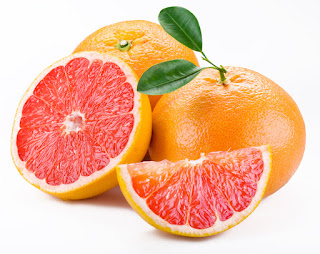It is said that
we are what we eat. But what should we eat if we want to be healthy and
good-looking? I would like to share with you a list of some products that
scientist agree on their good effect. I was trying to find some new science
researches on that so let’s take a look on that and maybe you will decide to
add some of these products to your daily nutrition.
1. Onion. Did you know that in
onion peel you can find a substance called quercetin
that has
been known to have anticholesterol, antithrombotic and insulin-sensitizing
properties? These days’ studies investigated the effect of quercetin-rich onion
peel extract on antioxidants amount and weight loss for obese women too.
Results showed that onion consumption significantly reduced waist and hip circumference
for obese women. To add more, dangerous active oxygen forms were reduced, so it
proved that onion can be used as an effective antioxidant.
2. Grapefruit. In the last study, consumption of
grapefruit was associated with higher intakes of vitamin C, magnesium,
potassium, dietary fiber, and improved diet quality. Grapefruit may
provide a healthful option for adults striving to meet fruit recommendations.
3. Polygonum minus or locally known in Malaysia, as "kesum" is rich in micronutrients and natural antioxidants. However, its beneficial effect on outcome associates with oxidative stress including cognitive function is yet to be discovered. But supplementation of kesum is safe to be consumed for 6 weeks, with potential benefits to attention, short-term memory, improved quality of life, and mood, as well as IQ.
4. Yogurt. There is a latest
research that was investigating effects of high-protein vs. high- fat snacks on
appetite control The purpose of this study was to determine whether a
high-protein afternoon yogurt snack improves appetite control, satiety, and
reduces subsequent food intake compared to other commonly-consumed, energy
dense, high-fat snacks. These data suggest that, when compared to high-fat
snacks, eating less energy dense, high-protein snacks like yogurt improves
appetite control, satiety, and reduces subsequent food intake in healthy women. So
probably it could be a good choice for those who want to reduce their daily
calorie intake.
5. Cocoa! Chocolate
and other cocoa products are not all alike. They differ between themselves in
term of nutrients, calories, and bioactive constituents. Therefore, some of
them are unhealthy foods, whereas others do not affect health and still others
are healthy foods. If you decide to eat chocolate, you should prefer to choose
this one with bigger amount of cocoa, because it has less fatty calories and
also it can even make your metabolism work faster and reduce harmful oxygen forms
amount in the blood.
6. Calcium
is known to have a good impact on bones (so for a good posture as well), but
there are also some evidences that calcium supplementation may decrease blood
pressure and consequently cardiovascular disease.
7. Decreased appetite and the improvement of
the quality of sleep could have a significant impact on the nutritional status. There is such thing as melatonin supplementation that
has a beneficial effect on the quality of sleep and reduction of body weight.
It may be stated that the results of the studies of many researchers indicate
that melatonin can be safely and permanently used in combined treatment of
obesity in postmenopausal women.
8. Fruits and
vegetables! The benefits in researches were greater for fruits
compared to vegetables and strongest for berries, apples/pears, tofu/soy,
cauliflower, and cruciferous and green leafy vegetables. A stronger association
were found between increased intakes of higher fiber, lower glycemic index
(lower carbohydrate quality) vegetables and weight change, consistent with
experimental evidence suggesting an influence of these factors on satiety, fat
storage and energy expenditure. Many vegetables were inversely associated with
weight change, but starchy vegetables such as peas, potatoes, and corn had
the opposite association in which increased intake was associated with
weight gain. Although these vegetables have nutritional value (potassium,
vitamin C, vitamin B6, iron, fiber, and protein), they have a higher
glycemic index that could explain their positive association with weight
change.
No matter what we will choose to eat, the
most important thing is to listen to our body.
You have some
questions? Doubts? Experience to share? You need to find more healthy products
that will improve your life quality or other topics on beauty/health/nutrition
you want to read about? Please, feel free to write some comments below.












